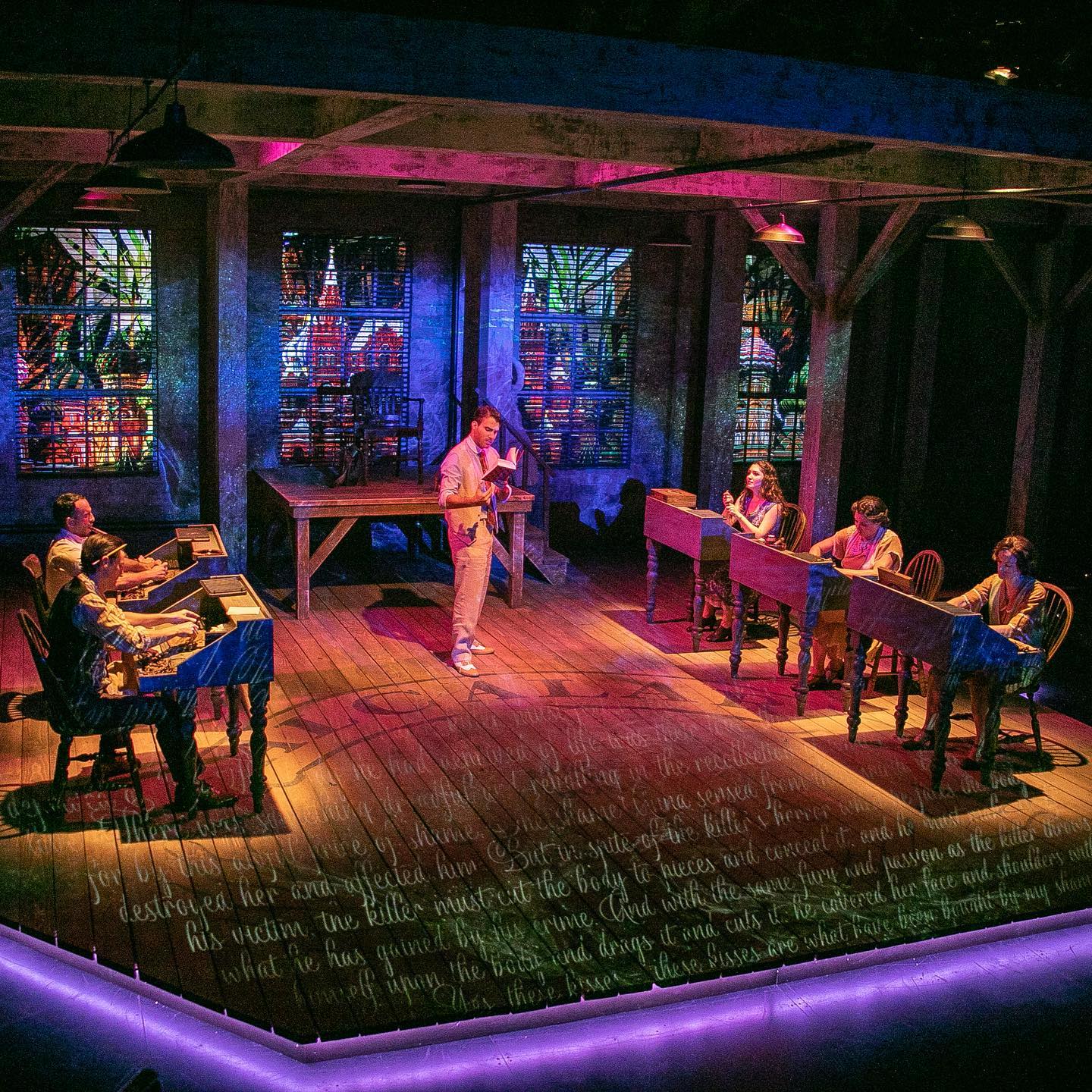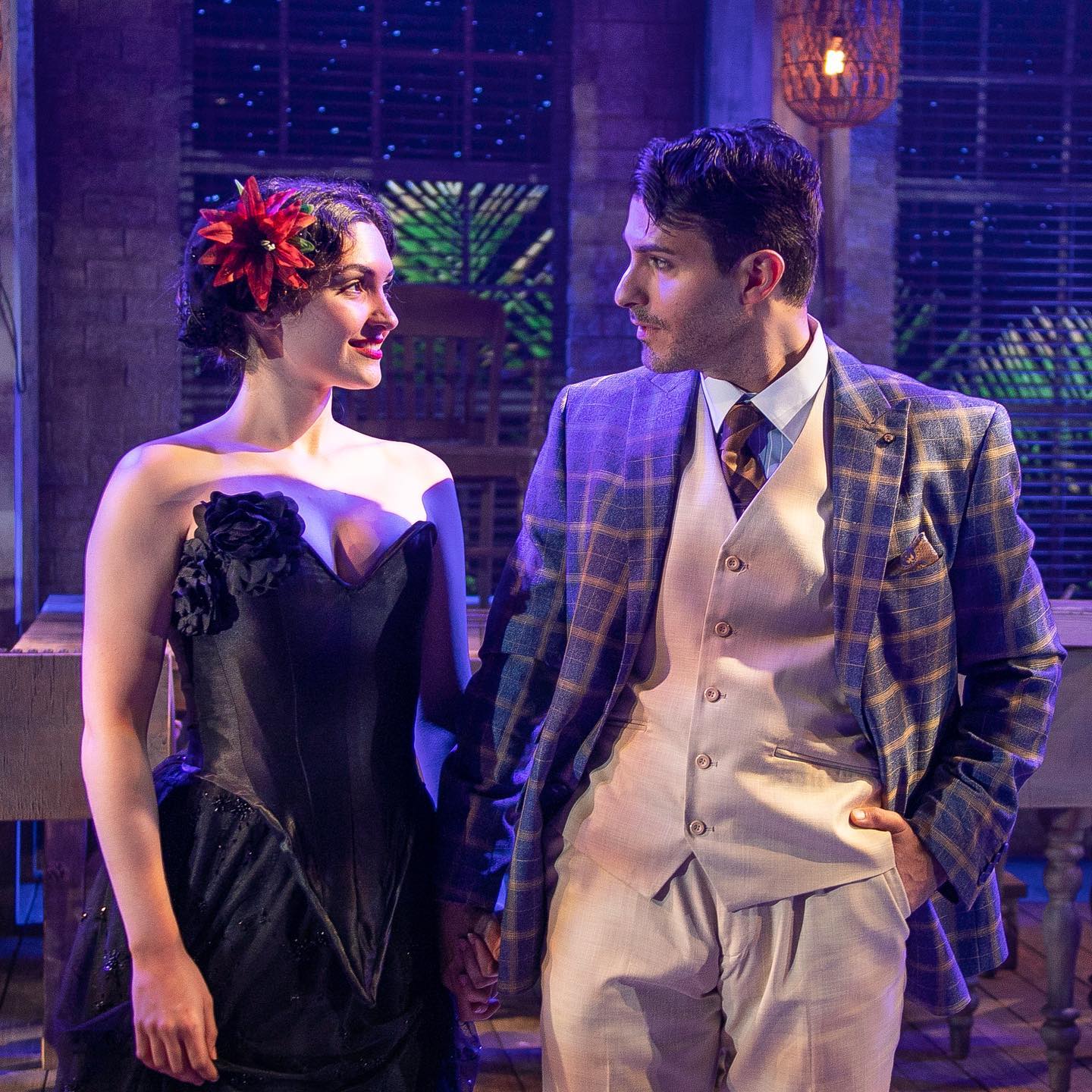Review: Bay Street's 'Anna in the Tropics' Is Sexy, Shocking, Raw

The story structure of family/cultural traditions versus modernization and new ideas is as old as stories themselves, and while many of these try to find some middle-ground compromise where each side learns a little from the other’s perspective, in the 2002 play Anna in the Tropics, Cuban American playwright Nilo Cruz seems to paint a clear picture: at least in the context of this text, modernization is the enemy.
Bay Street Theater’s latest MainStage hit, directed by Marcos Santana, is a fascinating snapshot of life in Cuban Florida at a point in time when their traditions are at risk of coming to an end.
For those unfamiliar with this 20-year-old play, Anna in the Tropics is set in 1929 Tampa, in a cigar rolling factory owned by a Cuban American family who has just hired a new lector to read literature to them as they work. This cherished Cuban tradition is despised by CheChe (Christian Barillas), the long-lost half-brother of the factory’s founder Santiago (Serafin Falcon) and the main driving force for modernization in the play.
As he attempts to steer the family in what he believes to be the right direction and to help them turn a profit — by replacing the lector with machines to speed up production — he is berated and ostracized. In another play, perhaps he’d be the hero who overcame adversity to save the family business, but here, he spirals into actions so irredeemable that he almost singlehandedly creates the need for Bay Street’s trigger warning on the ticket page.
Barillas skillfully hits every note of CheChe’s transformation from odd man out to determined innovator to tragic villain with calculated precision.
Beyond the foundation of tradition versus modernization, Anna in the Tropics delves deep into the three L’s of love, lust and literature. There isn’t a totally platonic character in the cast between the two married couples — Santiago and Ofelia (Iliana Guibert), and Paloma (Guillermo Ivan) and Conchita (Christine Spang) — the eye- and ear-catching lector Juan Julian (Anthony Michel Martinez) who steals the hearts of sisters Marela (Maria Isabel Bilbao) and Conchita, and the bitter, lustful CheChe.

The married men of the play must learn to better prioritize and listen to their partner’s needs if they hope to save the relationship.
Santiago begins the first scene looking worse off than CheChe, gambling his money away and begging his half-brother for loans. He spends a good portion of the first act wallowing until he plays a big role in the funniest scene of the play alongside the characters of Ofelia and Marela. At the end of the scene, Falcon effortlessly pulls off one of the sweetest, most emotionally sincere moments in the act, instantly winning over any audience members still on the fence about his character.
Like in many households across North and Latin America, the mother is the backbone of the family in Anna in the Tropics. Guibert’s Ofelia is unflappable and determined to fend off threats to her family and her traditions. She has the least to learn and grow from throughout the course of the play, but this consistency in her character is welcome among more dynamic characters like Conchita.
Speaking of Ofelia’s eldest daughter, the audience is treated to Conchita’s transformation from shy and unfulfilled to sexually adventurous and better able to communicate her desires. From the audience’s perspective, the role of Conchita seemed a daunting tightrope with so much nuance and growth to her character, and Spang walked that rope with confidence and grace.
If there was an award for best facial reactions, it would go to Ivan for his portrayal of Paloma. With the character serving as an almost secondary antagonist with off-putting jealous husband tendencies, the risk of making him unlikeable was high, but what Ivan did so masterfully was communicate through his face just how much genuine pain his character was feeling — and not just while delivering lines.
In one scene in particular, when Conchita is describing how her new lover satisfies her, each detail makes him wince a bit more, turn redder, gradually build up a dam of tears that burst so naturally during her retelling that one would think it impossible to fake. It did wonders to prove to the audience he wasn’t just jealous; he was devastated that he had failed to give his wife what she needed and would work diligently to remedy that.
Bilbao as Marela was pure joy to witness. With as much drama is packed into this play, she was most often the biggest source of levity and humor. Again, her “telephone” scene with the parents was hilarious, and she brightened up many of the otherwise tense scenes she was in. Her character’s childlike wonder does make a particular scene or two all the more devastating, but that’s part of Cruz’s brilliance, one might say.
Finally, the catalyst that sparks all the lust, love and literature going around during the play, Juan Julian the lector is as suave and charming as can be, made all the more so by Martinez’s brilliant performance. His voice carries each line of Anna Karenina, the play’s namesake, across the stage like a love song, setting the hearts of the other characters into a frenzy, and every line of dialogue is delivered with a captivating air of decorum.
The sets and visual effects were up to Bay Street’s usual high standard, and the sound and lighting design had a few interesting surprises in store.
Santana’s take on Anna in the Tropics is sexy, shocking and emotionally raw.
For tickets, call Bay Street Theater at 631-725-9500 or visit baystreet.org. And for those put off by the mandatory masks during the Windfall run, rest assured they are now optional.



